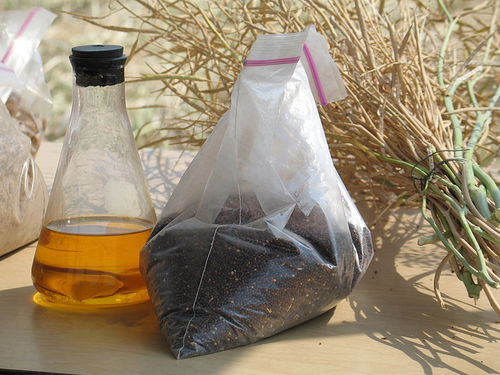Hydraulic Fluid
Overview
Hydraulic fluids, also called hydraulic liquids, are the medium by which power is transferred in hydraulic machinery. Common hydraulic fluids are based on mineral oil or water, with biodegradable vegetable oil fluids (primarily based on canola oil) also becoming commercially accepted. Unmodified vegetable oil tend to oxidize easily; it may be advisable to protect the fluid from air exposure in equipment, use additives, or possibly continuously degas (e.g. [1]).
Examples of equipment that might use hydraulic fluids include excavators and backhoes, brakes, power steering systems, transmissions, garbage trucks, aircraft flight control systems, lifts, and industrial machinery.
It forms the basis for much of the power transmission for GVCS technologies.
Hydraulic systems like the ones mentioned above will work most efficiently if the hydraulic fluid used has low compressibility. Lubricating properties of the fluid are also important (particularly an issue with water-based fluids).
Types
- 4 types include water-based - which must address corrosion. [2]
- Rape and sunflower, and perennial pecan - are viable sources of hydraulic fluid due to low oxidation with their high oleic acid content, except for pecan which is good based on perennial nature.
- Bio - rape and sunflower can be used immediately, rape produces 125 gal/acre.
- 55 of 5 gal pails means $1500 revenue
Product Ecology
Created by
- Canola (rapeseed) field crop
Uses
Creates
- Power
- Enables all biohydraulic vehicles
Internal Links
External Links
- The Wikipedia Page on Hydraulic Fluid
- "Hydro Safe Inc" A Company Making Plant Oil based Lubricating Oils and Hydraulic Fluid (May want to make a page on the group?)
